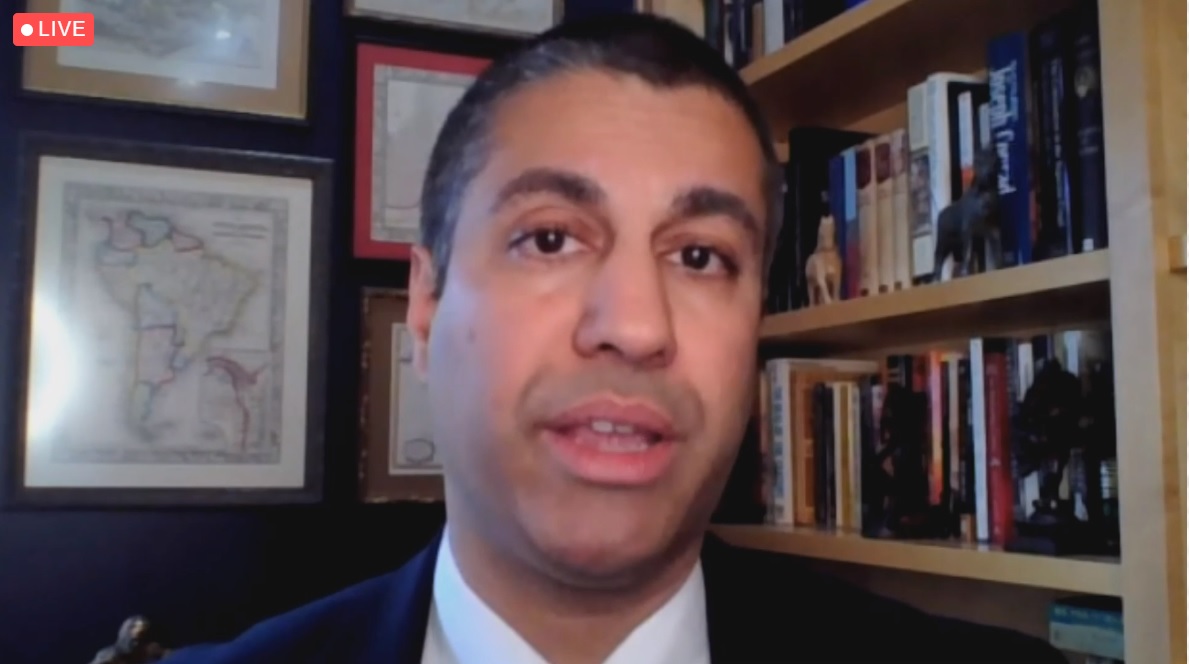Ajit Pai Says He Is Leaving FCC Better Than He Found It
Cites process reforms stress-tested by pandemic

The smarter way to stay on top of the multichannel video marketplace. Sign up below.
You are now subscribed
Your newsletter sign-up was successful
FCC chairman Ajit Pai, who is exiting the commission Jan. 20, said his reforms of the agency since taking over in 2017 have fundamentally changed the FCC for the better.
Also Read: Pai Makes Exit Official
In a virtual address to the Free State Foundation, Pai took something of a victory lap, outlining the ways he thought his process reforms had made the agency more transparent and effective, by clearing out the regulatory underbrush, a pledge he made early on.
Pai also suggested that Free State's advocacy for process reform had played a part in "helping to build an intellectual foundation for important changes to what we do and how we do it."
Pai dismissed his critics as generally been from outsiders "lobbing complaints" from a "comfortable perch on the outside," dismissing them as "talking heads, Twitter 'experts,' and others..."
Also Read: Free State Says Streamlining FCC Hearings Could Promote Better Decisionmaking
By contrast, he argued, he had been in the arena and put in the work, first as a staffer, then commissioner then chairman.
The smarter way to stay on top of the multichannel video marketplace. Sign up below.
He relayed the good governance lessons he learned well enough, he suggested, to make "historic and positive changes—changes that should endure long after I’m gone."
The three "pillars" to that good governance, he said, were 1) transparency, 2) an "embrace of economics and data analysis, and, most importantly, 3) maximizing the effectiveness of the commission's biggest asset, it's people.
Pai said he has done all that, offering as examples his decision to release draft items for public inspection three weeks before FCC meetings; including a one-page summary, a suggestion he credited to former acting chair and commissioner Mignon Clyburn; his creation of the Office of Economics and Analytics and formalizing the cost-benefit analysis he had long argued should be done on all regulation; and staying in-house as much as possible rather than bring in "outsiders" to head bureaus and offices.
On that last pillar, Pai advised fellow conservatives in government that it was a mistake to view career staff as "the enemy." He said it had been his experience that the work to advance "any" leader's policy views, even those they disagree with, adding "they are good people who love their country."
Also Read: FCC's Pai Institutes More Process Reforms
That is in contrast to President Trump's suggestion of a deep state of imbedded government staffers working for the opposition.
Pai said that while it is sometimes hard to measure the impact of good governance reforms, it had been stress-tested by the pandemic. He suggested it had passed that test, continuing its work remotely "unabated" while granting temporary authorities to use spectrum to meet increased connectivity demands, including for schools, low income households and those with disabilities, and rapidly standing up a congressionally mandated $200 million telehealth program.
"We made the agency more transparent. We cemented the importance of good economic analysis," he said. "And we put our people first. Thanks to these key reforms, I would like to think I’m leaving the agency better off than when I arrived."
Contributing editor John Eggerton has been an editor and/or writer on media regulation, legislation and policy for over four decades, including covering the FCC, FTC, Congress, the major media trade associations, and the federal courts. In addition to Multichannel News and Broadcasting + Cable, his work has appeared in Radio World, TV Technology, TV Fax, This Week in Consumer Electronics, Variety and the Encyclopedia Britannica.

